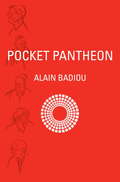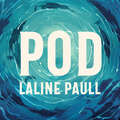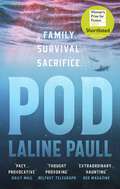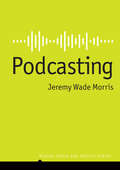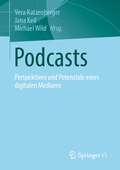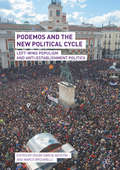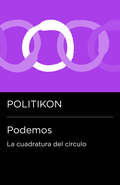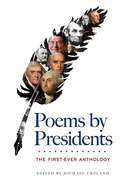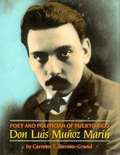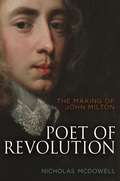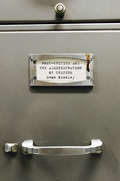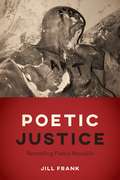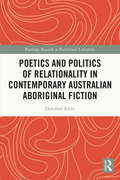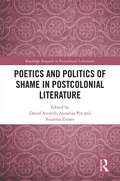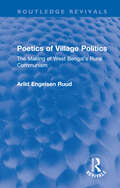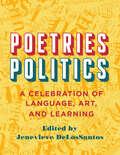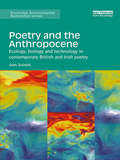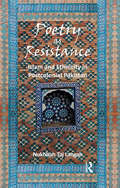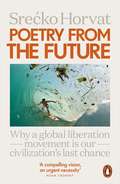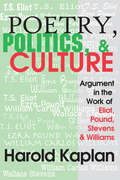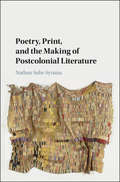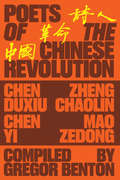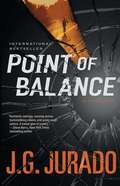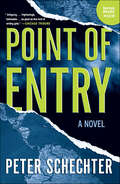- Table View
- List View
Pocket Bios: Princess Diana (Pocket Bios)
by Al BerengerA colorfully illustrated, pocket-size picture book biography of famous British royal, Princess Diana. Princess Diana was the wildly popular first wife of Charles, Prince of Wales. Known as "the People's Princess," she was involved in many charities, including the British Deaf Association, and supported other controversial causes like AIDS and the ban of landmines. From her engagement to Prince Charles, Princess Di had a special connection with the public in England and around the world. Her tumultuous marriage was subject to aggressive media attention, and she was forever memorialized in the hearts of the British people after her death in a tragic car crash in Paris.About the Pocket Bios series:Pocket Bios are full of personality, introducing readers to fascinating figures from history with simple storytelling and cheerful illustrations. Titles include men and women from history, exploration, the sciences, the arts, the ancient world, and more. Want to know more about women in history? Don't miss the Pocket Bios about Cleopatra, Rosa Parks, Anne Frank, Marie Antoinette, Joan of Arc, and Pocahontas.
Pocket Pantheon: Figures of Postwar Philosophy
by David Macey Alain BadiouPocket Pantheon is an invitation to engage with the greats of postwar Western thought, such as Lacan, Sartre and Foucault, in the company of one of today's leading political and philosophical minds. Alain Badiou draws on his encounters with this pantheon--his teachers, opponents and allies--to offer unique insights into both the authors and their work. These studies form an accessible, authoritative distillation of continental theory and a capsule history of a period in Western thought.From the Trade Paperback edition.
Pod: 'A pacy, provocative tale of survival in a fast-changing marine landscape' Daily Mail
by Laline Paull'Laline Paull succeeds splendidly in rising to the most important literary challenge of our time - restoring voice and agency to other-than-human beings' Amitav Ghosh'A pacy, provocative tale of survival in a fast-changing marine landscape' Daily MailBestselling author Laline Paull returns with an immersive and transformative new novel of an ocean world - its extraordinary creatures, mysteries, and mythologies - that is increasingly haunted by the cruelty and ignorance of the human race.Ea has always felt like an outsider. She suffers from a type of deafness that means she cannot master the spinning rituals that unite her pod of spinner dolphins. When tragedy strikes her family and Ea feels she is partly to blame, she decides to make the ultimate sacrifice and leave.As Ea ventures into the vast, she discovers dangers everywhere, from lurking predators to strange objects floating in the water. But just as she is coming to terms with her solitude, a chance encounter with a group of arrogant bottlenoses will irrevocably alter the course of her life.In her terrifying, propulsive novel, Laline Paull explores the true meaning of family, belonging, sacrifice - the harmony and tragedy of the pod - within an ocean that is no longer the sanctuary it once was, and which reflects a world all too recognisable to our own.PRAISE FOR THE BEES 'Beautifully written and unusual . . . A brave and original story that highlights our modern environmental crimes, and offers a fascinating glimpse into the intricacies of bee world' Sunday Times 'One wild ride. A sensual, visceral mini-epic about timeless rituals and modern environmental disaster. Paull's heart-pounding novel wrenches us into a new world' Emma Donoghue '[A] gripping Cinderella/Arthurian tale with lush Keatsian adjectives' Margaret Atwood 'An extraordinary feat of imagination' Madeline Miller
Pod: From the Women's Prize shortlisted author of The Bees
by Laline Paull'Laline Paull succeeds splendidly in rising to the most important literary challenge of our time - restoring voice and agency to other-than-human beings' Amitav Ghosh'A pacy, provocative tale of survival in a fast-changing marine landscape' Daily MailBestselling author Laline Paull returns with an immersive and transformative new novel of an ocean world - its extraordinary creatures, mysteries, and mythologies - that is increasingly haunted by the cruelty and ignorance of the human race.Ea has always felt like an outsider. She suffers from a type of deafness that means she cannot master the spinning rituals that unite her pod of spinner dolphins. When tragedy strikes her family and Ea feels she is partly to blame, she decides to make the ultimate sacrifice and leave.As Ea ventures into the vast, she discovers dangers everywhere, from lurking predators to strange objects floating in the water. But just as she is coming to terms with her solitude, a chance encounter with a group of arrogant bottlenoses will irrevocably alter the course of her life.In her terrifying, propulsive novel, Laline Paull explores the true meaning of family, belonging, sacrifice - the harmony and tragedy of the pod - within an ocean that is no longer the sanctuary it once was, and which reflects a world all too recognisable to our own.PRAISE FOR THE BEES 'Beautifully written and unusual . . . A brave and original story that highlights our modern environmental crimes, and offers a fascinating glimpse into the intricacies of bee world' Sunday Times 'One wild ride. A sensual, visceral mini-epic about timeless rituals and modern environmental disaster. Paull's heart-pounding novel wrenches us into a new world' Emma Donoghue '[A] gripping Cinderella/Arthurian tale with lush Keatsian adjectives' Margaret Atwood 'An extraordinary feat of imagination' Madeline Miller
Podcasting (Digital Media and Society)
by Jeremy Wade MorrisPodcasting burst onto the media landscape in the early 2000s. At the time, there were hopes it might usher in a new wave of amateur and professional cultural production and represent an alternate model for how to produce, share, circulate and experience new voices and perspectives. Twenty years later, podcasting is at a critical juncture in its young history: a moment where the early ideals of open standards and platform-neutral distribution are giving way to services that prioritize lean-back listening and monetizable media experiences. This book provides an accessible and comprehensive account of one of digital media’s most vibrant formats. Focusing on the historical changes shaping podcasts as a media format, the book explores the industrial, technological and cultural components of podcasting alongside case studies of various podcasts, industry publications, and streaming audio platforms (e.g. Spotify, Google and Apple Podcasts). Jeremy Morris argues that as streaming platforms push to make podcasting more industrialized, accessible, user-friendly and similar to other audio media like music or audiobooks, they threaten podcasting’s early, though always unrealized, promises. This is the go-to introduction for students and researchers of media, communication and cultural studies, as well as readers who enjoy making and listening to podcasts.
Podcasts: Perspektiven und Potenziale eines digitalen Mediums
by Michael Wild Vera Katzenberger Jana KeilPodcasts boomen: Immer mehr Anbieter drängen mit eigenen Formaten auf den Markt. Gleichzeitig nimmt die regelmäßige Nutzung in allen Publikumsgruppen stetig zu. Diesen vielfältigen Potenzialen des neuen Mediums steht eine in Deutschland noch verhältnismäßig überschaubare Forschungslage gegenüber. Der Sammelband soll dazu beitragen, Podcasts als neues Forschungsfeld der Medien- und Kommunikationswissenschaft abzustecken. Der Sammelband erstreckt sich thematisch von den Podcaster*innen, dem Medium und seinen inhaltlichen Besonderheiten bis hin zum Rezeptionsprozess und den Hörer*innen.
Podemos and the New Political Cycle
by Óscar García Agustín Marco BriziarelliThis edited volume explores the context in which the Spanish party Podemos operates as both an agent and product of political cycles. It provides an account of the party's genealogy, ideological environment and relation to other political initiatives in Latin America and Western Europe. The contributors address the multiples dynamics generated by Podemos as a new party developed out of the economic crisis, the structural crisis concerning social democracy and the incarnation of the welfare state project, and, more generally, out of the Left. It will appeal to upper-level students and scholars interested in Spanish politics, history, culture and sociology.
Podemos: la cuadratura del círculo
by PolitikonUn análisis objetivo del fenómeno que ha sacudido la política españolaLa noche del 25 de mayo de 2014, entre gritos de "que sí, que sí, que sí nos representan", Pablo Iglesias aparecía para dar su discurso en una plaza céntrica de Madrid. Su partido, Podemos, había sido el único vencedor rotundo de las elecciones europeas. Ante este éxito, es natural que se haya vuelto un tema de conversación recurrente. Ese interés está justificado por su sorpresiva irrupción en las elecciones, su espectacular crecimiento en las encuestas, y su capacidad para coordinar el voto indignado en torno a su plataforma.En La Urna Rota hablamos del reto de la organización de intereses ignorados por los partidos tradicionales, y el rol de los emprendedores políticos. Este breve texto nace como addendum a lo que allí discutimos. Aquí pretendemos indagar tanto en las claves que explican la aparición y el éxito, por ahora, de Podemos, como en los retos a los que tendrá que enfrentarse.
Poems by Presidents: The First-Ever Anthology
by Heidi Gagnon"Well-written, thoroughly researched, and impeccably organized, Poems by Presidents explores an intriguing and unexpected side to many American presidents: they wrote poetry! In this excellent anthology of presidential poems, Michael Croland offers us a new way to celebrate some of our most celebrated leaders." —Susan Katz, author of The President’s Stuck in the Bathtub. This first-ever anthology features poems by eleven presidents who, through good times and bad, turned to poetry to express themselves. This compelling collection brings presidents’ literary pursuits to light, unveiling their deepest thoughts and emotions. Highlights include George Washington’s teenage romantic yearnings, Thomas Jefferson’s death-bed adieu, John Quincy Adams’s sonnet memorializing his father, Abraham Lincoln’s mockery of the Confederacy, Woodrow Wilson’s humorous limericks, Warren G. Harding’s steamy love poems to his mistress, and Ronald Wilson Reagan’s existential reflections. Appendixes explore additional presidents who wrote poetry, misattributions, prose formatted as verse, and fondness for poetry. Poems by Presidents is a rewarding resource for poetry lovers and readers interested in presidential biographies and American history. "From Madison’s collegiate satires to Harding’s racy romantic rhymes, this anthology has something to surprise and delight even the most dedicated history buff. It will teach you something about our presidents’ personal lives, their poetic talents, and even their political ambitions." —Craig Fehrman, author of Author in Chief "This distinctive collection is a pleasure to read and enjoy. It provides another dimension to our awareness of the personalities and talents of many of our presidents." —Fred Kaplan, author of His Masterly Pen: A Biography of Jefferson the Writer "Michael Croland has assembled an interesting and unexpected anthology of presidential poetry. Poems by Presidents leaves the reader with a better understanding of the concealed humanity often buried within the seemingly stoic men who have held our nation’s highest office." —Michael B. Costanzo, author of Author in Chief "This unique collection by US presidents, featuring poems ranging from spiritual to humorous to erotic, is surprising, fascinating, and humanizing." —Marilyn Singer, author of Rutherford B., Who Was He?: Poems about Our Presidents "A wonderful volume, full of keen insights into a wide array of American presidents. . . . The superb focus of this book brings fascinating details to light." —Jonathan Gross, editor of Thomas Jefferson’s Scrapbooks
Poet and Politician of Puerto Rico: Don Luis Munoz Marin
by Carmen T. Bernier-GrandGrade 5-8. A biography on the life of Puerto Rico's first elected governor. While the beginning of the book focuses on his personal life and desire to be a writer, the latter part concentrates on his political career and efforts to bring about social and political reform in his native land. The man's life is conveyed clearly and chronologically, although the author does not include the exact years of many events within the text, which could lead to some confusion.
Poet of Revolution: The Making of John Milton
by Nicholas McDowellA groundbreaking biography of Milton’s formative years that provides a new account of the poet’s political radicalizationJohn Milton (1608–1674) has a unique claim on literary and intellectual history as the author of both Paradise Lost, the greatest narrative poem in English, and prose defences of the execution of Charles I that influenced the French and American revolutions. Tracing Milton’s literary, intellectual, and political development with unprecedented depth and understanding, Poet of Revolution is an unmatched biographical account of the formation of the mind that would go on to create Paradise Lost—but would first justify the killing of a king.Biographers of Milton have always struggled to explain how the young poet became a notorious defender of regicide and other radical ideas such as freedom of the press, religious toleration, and republicanism. In this groundbreaking intellectual biography of Milton’s formative years, Nicholas McDowell draws on recent archival discoveries to reconcile at last the poet and polemicist. He charts Milton’s development from his earliest days as a London schoolboy, through his university life and travels in Italy, to his emergence as a public writer during the English Civil War. At the same time, McDowell presents fresh, richly contextual readings of Milton’s best-known works from this period, including the “Nativity Ode,” “L’Allegro” and “Il Penseroso,” Comus, and “Lycidas.”Challenging biographers who claim that Milton was always a secret radical, Poet of Revolution shows how the events that provoked civil war in England combined with Milton’s astonishing programme of self-education to instil the beliefs that would shape not only his political prose but also his later epic masterpiece.
Poet-Critics and the Administration of Culture
by Evan KindleyAfter the 1929 crash, Anglo-American poet-critics grappled with the task of legitimizing literature for public funding and consumption. Modernism, Evan Kindley shows, created a new form of labor for writers to perform and gave them unprecedented say over the administration of culture, with consequences for poetry’s role in society still felt today.
Poetic Justice: Rereading Plato's "Republic"
by Jill FrankWhen Plato set his dialogs, written texts were disseminated primarily by performance and recitation. He wrote them, however, when literacy was expanding. Jill Frank argues that there are unique insights to be gained from appreciating Plato’s dialogs as written texts to be read and reread. At the center of these insights are two distinct ways of learning to read in the dialogs. One approach that appears in the Statesman, Sophist, and Protagoras, treats learning to read as a top-down affair, in which authoritative teachers lead students to true beliefs. Another, recommended by Socrates, encourages trial and error and the formation of beliefs based on students’ own fallible experiences. In all of these dialogs, learning to read is likened to coming to know or understand something. Given Plato’s repeated presentation of the analogy between reading and coming to know, what can these two approaches tell us about his dialogs’ representations of philosophy and politics? With Poetic Justice, Jill Frank overturns the conventional view that the Republic endorses a hierarchical ascent to knowledge and the authoritarian politics associated with that philosophy. When learning to read is understood as the passive absorption of a teacher’s beliefs, this reflects the account of Platonic philosophy as authoritative knowledge wielded by philosopher kings who ruled the ideal city. When we learn to read by way of the method Socrates introduces in the Republic, Frank argues, we are offered an education in ethical and political self-governance, one that prompts citizens to challenge all claims to authority, including those of philosophy.
Poetics and Politics of Relationality in Contemporary Australian Aboriginal Fiction (Routledge Research in Postcolonial Literatures)
by Dorothee KleinPoetics and Politics of Relationality in Contemporary Australian Aboriginal Fiction is the first sustained study of the formal particularities of works by Bruce Pascoe, Kim Scott, Tara June Winch, and Alexis Wright. Drawing on a rich theoretical framework that includes approaches to relationality by Aboriginal thinkers, Edouard Glissant, and Jean-Luc Nancy, and recent work in New Formalism and narrative theory, it illustrates how they use a broad range of narrative techniques to mediate, negotiate, and temporarily create networks of relations that interlink all elements of the universe. Through this focus on relationality, Aboriginal writing gains both local and global significance. Locally, these narratives assert Indigenous sovereignty by staging an unbroken interrelatedness of people and their Land. Globally, they intervene into current discourses about humanity’s relationship with the natural environment, urging readers to acknowledge our interrelatedness with and dependence on the land that sustains us.
Poetics and Politics of Shame in Postcolonial Literature (Routledge Research in Postcolonial Literatures)
by David Attwell Annalisa Pes Susanna ZinatoPoetics and Politics of Shame in Postcolonial Literature provides a new and wide-ranging appraisal of shame in colonial and postcolonial literature in English. Bringing together young and established voices in postcolonial studies, these essays tackle shame and racism, shame and agency, shame and ethical recognition, the problem of shamelessness, the shame of willed forgetfulness. Linked by a common thread of reflections on shame and literary writing, the essays consider specifically whether the aesthetic and ethical capacities of literature enable a measure of stability or recuperation in the presence of shame’s destructive potential. The obscenity of the in-human, both in the colonial setting and in aftermaths that show little sign of abating, entails the acute significance of shame as a subject for continuing and urgent critical attention.
Poetics of Village Politics: The Making of West Bengal's Rural Communism (Routledge Revivals)
by Arild Engelsen RuudOriginally published in 2003, this volume studies village politics and the changes brought about in rural society through political developments. It focuses on the social, political and cultural circumstances of communist mobilization in rural West Bengal. It analyses the emergence of rural communism in the local context of changes in the position of women, in caste practices, in economic conditions and in new efforts to create ‘development’. It investigates how this cultural change interacts with the mechanisms and tools of village politics, and using anthropological methods and oral history as tools, allows for a detailed and intimate ethnographic description of village politics and its changes.
Poetries - Politics: A Celebration of Language, Art, and Learning
by Mary Shaw Francois Cornilliat Atif Atkin Ouafaa Deleger Ian Lovoulos Devon Monaghan Jenevieve DeLosSantosPoetries – Politics: A Celebration of Language, Art, and Learning celebrates the best of innovative humanities pedagogy and creative graphic design. Designed and implemented during a time of political divisiveness, the Poetries – Politics project created a space of inviting, multilingual walls on the Rutgers campus, celebrating diversity, community, and cross-cultural exchange. This book, like the original project, provides a platform for the incredible generative power of student-led work. Essays feature the perspectives of three students and professors originally involved in the project, reflecting on their learning and exploring the works they selected for the original exhibition. The essays lead to a beautifully illustrated catalogue of the original student designs. Reproduced in full color and with the accompanying poems in both their original language and a translation, this catalogue commemorates the incredible creative spirit of the project and provides a new way of contemplating these great poetic works.
Poetry and the Anthropocene: Ecology, biology and technology in contemporary British and Irish poetry (Routledge Environmental Humanities)
by Sam SolnickThis book asks what it means to write poetry in and about the Anthropocene, the name given to a geological epoch where humans have a global ecological impact. Combining critical approaches such as ecocriticism and posthumanism with close reading and archival research, it argues that the Anthropocene requires poetry and the humanities to find new ways of thinking about unfamiliar spatial and temporal scales, about how we approach the metaphors and discourses of the sciences, and about the role of those processes and materials that confound humans’ attempts to control or even conceptualise them. Poetry and the Anthropocene draws on the work of a series of poets from across the political and poetic spectrum, analysing how understandings of technology shape literature about place, evolution and the tradition of writing about what still gets called Nature. The book explores how writers’ understanding of sciences such as climatology or biochemistry might shape their poetry’s form, and how literature can respond to environmental crises without descending into agitprop, self-righteousness or apocalyptic cynicism. In the face of the Anthropocene’s radical challenges to ethics, aesthetics and politics, the book shows how poetry offers significant ways of interrogating and rendering the complex relationships between organisms and their environments in a world increasingly marked by technology.
Poetry as Resistance: Islam and Ethnicity in Postcolonial Pakistan
by Nukhbah Taj LangahFocusing on the culturally and historically rich Siraiki-speaking region, often tagged as ‘South Punjab’, this book discusses the ways in which Siraiki creative writers have transformed into political activists, resisting the self-imposed domination of the Punjabi–Mohajir ruling elite. Influenced by Sufi poets, their poetry takes the shape of both protest and dialogue. This book reflects upon the politics of identity and the political complications which are a result of colonisation and later, neo-colonisation of Pakistan. It challenges the philosophy of Pakistan — a state created for Muslims — which is now taking the shape of religious fanaticism, while disregarding ethnic and linguistic issues such as that of Siraiki.
Poetry from the Future: Why a Global Liberation Movement Is Our Civilisation's Last Chance
by Srecko Horvat'A compelling vision, an urgent necessity, and not beyond reach' Noam ChomskyThe past is forgotten, and the future is without hope. Dystopia has become a reality. This is the new normal in our apocalyptic politics - but if we accept it, our helplessness is guaranteed. To bring about real change, argues activist and political philosopher Srecko Horvat, we must first transform our mindset.Ranging through time and space, from the partisan liberation movements of Nazi-occupied Yugoslavia to the contemporary culture, refugee camps and political frontlines of 21st century Europe, Horvat shows that the problems we face today are of an unprecedented nature. To solve them, he argues in this passionate call for a new radical internationalism, we must move beyond existing ways of thinking: beyond borders, national identities and the redundant narratives of the past. Only in this way can we create new models for living and, together, shape a more open and optimistic future.
Poetry, Politics, and Culture: Argument in the Work of Eliot, Pound, Stevens, and Williams
by Harold KaplanA salient feature of modern poetics is its direct connection with cultural history and politics. Among the great American poets of the twentieth century, Wallace Stevens and William Carlos Williams offer a significant contrast with T. S. Eliot and Ezra Pound. Where the latter advocated a theocentric or reactionary response to the cultural crises of modernity, the former affirmed an essentially humanist and democratic social and aesthetic ethos. In Poetry, Politics, and Culture, Harold Kaplan offers a penetrating comparative study of these representative and distinctively influential poets.All four poets wrote in an atmosphere of cultural crisis following World War I, caught as they were between outmoded belief systems and various forms of artistic and political nihilism. While each believed in poetry as a source of cultural values and beliefs, they nevertheless experienced loss of confidence in their own vocation in a world characterized by scientific, rationalist thinking and the mundane struggle for survival. For each, therefore, the poetic imagination was a means of restoring order, or building a new civilization out of chaos. In trying to define a revitalized culture, the four exemplified the perennial quarrel between Europe and America.
Poetry, Print, and the Making of Postcolonial Literature
by Nathan Suhr-SytsmaPoetry, Print, and the Making of Postcolonial Literature reveals an intriguing history of relationships among poets and editors from Ireland and Nigeria, as well as Britain and the Caribbean, during the mid-twentieth-century era of decolonization. The book explores what such leading anglophone poets as Seamus Heaney, Christopher Okigbo, and Derek Walcott had in common: 'peripheral' origins and a desire to address transnational publics without expatriating themselves. The book reconstructs how they gained the imprimatur of both local and London-based cultural institutions. It shows, furthermore, how political crises challenged them to reconsider their poetry's publics. Making substantial use of unpublished archival material, Nathan Suhr-Sytsma examines poems in print, often the pages on which they first appeared, in order to chart the transformation of the anglophone literary world. He argues that these poets' achievements cannot be extricated from the transnational networks through which their poems circulated - and which they in turn remade.
Poets of the Chinese Revolution: Chen Duxiu, Zheng Chaolin, Chen Yi, Mao Zedong
by Mao Tse-Tung Chen Yi Chen DuxiuHow poetry and revolution meshed in Red ChinaThe Chinese Revolution, which fought its way to power seventy years ago, was a complex and protracted event in which groups and individuals with different hopes and expectations for the Revolution competed, although in the end Mao came to rule over the others. Its veterans included many poets, four of whom feature in this anthology. All wrote in the classical style, but their poetry was no less diverse than their politics. Chen Duxiu, led China’s early cultural awakening before founding the Communist Party in 1921. Mao led the Party to power in 1949. Zheng Chaolin, Chen Duxiu’s disciple and, like him, a convert to Trotskyism, spent thirty-four years in jail, first under the Nationalists and then under their Maoist nemeses. The guerrilla leader Chen Yi wrote flamboyant and descriptive poems in mountain bivouacs or the heat of battle.Poetry has played a different role in China, and in Chinese Revolution, from in the West—it is collective and collaborative. But in life, the four poets in this collection were entangled in opposition and even bitter hostility towards one another. Together, the four poets illustrate the complicated relationship between Communist revolution and Chinese cultural tradition.
Point of Balance: A Thriller (Atria Espanol Ser.)
by J. G. JuradoIn this superbly written, nail-biting thriller, a top neurosurgeon is forced to choose between ending the life of the most important person in America or guaranteeing his own daughter's horrifying death.I am no saint, no martyr, no terrorist, no madman, and no murderer...I am a father. That's my story. Dr. David Evans is a well-respected brain surgeon at a hospital in Washington, DC, and a devoted father. But soon he is faced with the ultimate dilemma: if his next patient, who must undergo brain surgery, leaves the operating table alive, Dr. Evans's kidnapped daughter will die at the hands of an implacable psychopath--and he will be forced to watch. Over the course of fifty-five frantic hours counting down to his choice in the surgery room, Dr. Evans races to hunt down his pursuer and find a way out of this nightmarish predicament. But just how far will he go to save his daughter's life? "A roller coaster ride of fear and excitement unparalleled in modern fiction" (New York Times bestselling author Katherine Neville), Point of Balance will keep you on the edge of your seat with fast-paced action and raw emotion, as one man faces an impossible moral dilemma that could change the course of history.
Point of Entry: A Novel
by Peter SchechterWith calculated cunning, renegade Syrian intelligence operatives have discovered how to smuggle uranium-235—the key material required to manufacture an atomic weapon—into the United States undetected, exploiting a network of the most experienced and sophisticated smugglers the world has ever known.As the CIA repeatedly misinterprets numerous intelligence warnings, only Marta Pradilla—Colombia's beautiful, hard-minded new president—can assist the United States' conservative, isolationist President Stockman in finding the terrorists and their deadly cargo before it's too late. Set in Washington, D.C., Bogotá, Rome, and Tbilisi, and featuring a cast of major international figures, Point of Entry brings readers into an intensely treacherous world that reads less like fiction every day.

